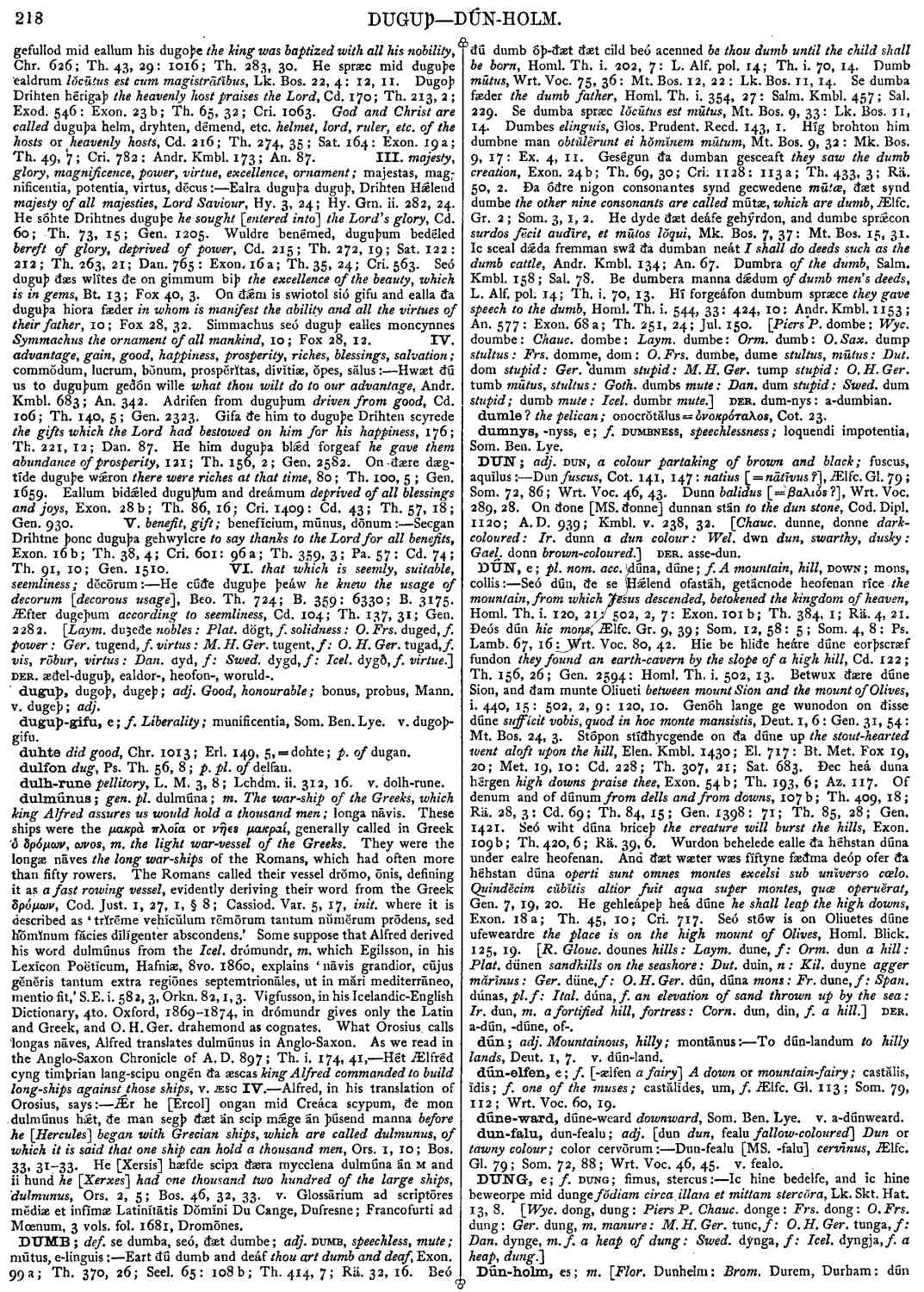DÚN
- noun [ feminine ]
-
Seódún , ðe se Hǽlend ofastáh, getácnode heofenan ríce
the mountain, from which Jesus descended, betokened the kingdom of heaven,
- Homl. Th. i. 120, 21: 502, 2, 7: Exon. 101 b ;
- Th. 384, 1;
- Rä. 4, 21.
-
Ðeós dún
hic mons,
- Ælfc. Gr. 9, 39;
- Som. 12, 58: 5 ;
- Som. 4, 8: Ps. Lamb. 67, 16: Wrt. Voc. 80, 42.
-
Hie be hliðe heáre dúne eorþscræf fundon
they found an earth-cavern by the slope of a high hill,
- Cd. 122 ;
- Th. 156, 26;
- Gen. 2594: Homl. Th. i. 502, 13.
-
Betwux ðære dúne Sion, and ðam munte Oliueti
between mount Sion and the mount of Olives,
i.- 440. 15: 502, 2, 9: 120, l0.
-
Genóh lange ge wunodon on ðisse dúne
sufficit vobis, quod in hoc monte mansistis,
- Deut. 1, 6: Gen. 31, 54: Mt. Bos. 24, 3.
-
Stópon stíðhycgende on ða dúne up
the stout-hearted went aloft upon the hill,
- Elen. Kmbl. 1430 ;
- El. 717: Bt. Met. Fox 19, 20;
- Met. 19, 10: Cd. 228 ;
- Th. 307, 21;
- Sat. 683 .
-
Ðec heá duna hérgen
high downs praise thee,
- Exon. 54 b ;
- Th. 193, 6;
- Az. 117 .
-
Of denum and of dúnum
from dells and from downs,
107 b;- Th. 409, 18;
- Rä. 28, 3: Cd. 69 ;
- Th. 84, 15;
- Gen. 1398: 71 ;
- Th. 85, 28;
- Gen. 1421 .
-
Seó wiht dúna briceþ
the creature will burst the hills,
- Exon. 109 b ;
- Th. 420, 6;
- Rä. 39, 6.
-
Wurdon behelede ealle ða héhstan dúna under ealre heofenan. And ðæt wæter wæs fíftyne fæðma deóp ofer ða héhstan dúna
operti sunt omnes montes excelsi sub unĭverso cælo. Quindĕcim cŭbĭtis altior fuit aqua super montes, quæ operuĕrat,
- Gen. 7, 19, 20.
-
He gehleápeþ heá dúne
he shall leap the high downs,
- Exon. 18 a ;
- Th. 45, 10;
- Cri. 717 .
-
Seó stów is on Oliuetes dúne ufeweardre
the place is on the high mount of Olives,
- Homl. Blick. 125, 19.
Bosworth, Joseph. “DÚN.” In An Anglo-Saxon Dictionary Online, edited by Thomas Northcote Toller, Christ Sean, and Ondřej Tichy. Prague: Faculty of Arts, Charles University, 2014. https://bosworthtoller.com/8106.
Checked: 1